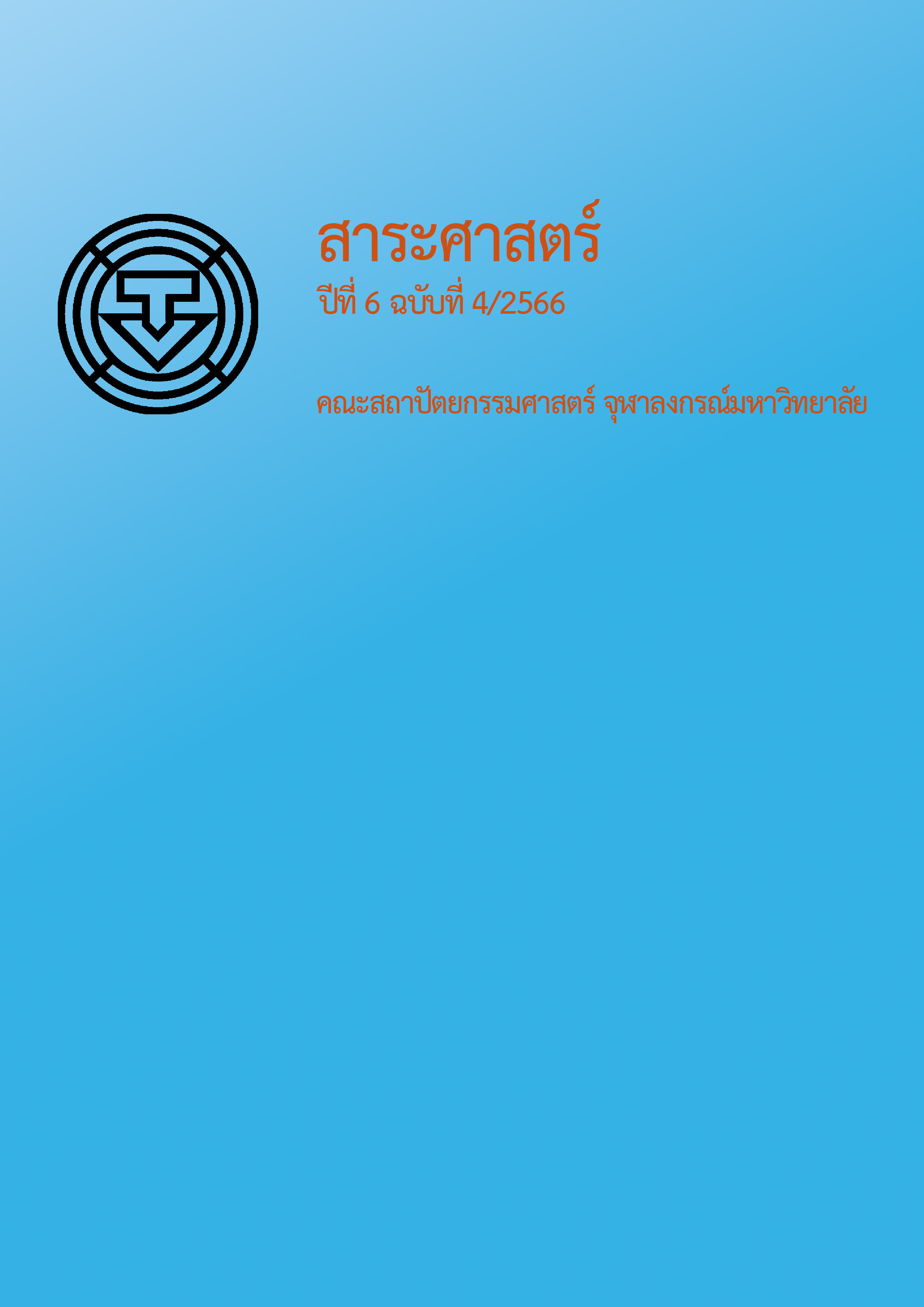The Development of an Instrument to Assess Ecological Literacy of High School Students for Sustainable Landscape Planning: A Case Study of Cha-am Beach, Phetchaburi Province
Main Article Content
Abstract
Cha-am Beach is renowned for its outstanding natural beauty as well as historical and local identity. As a popular tourist destination, Cha-am Beach has been rapidly developed in to support tourism. The use of beach areas for parking and the domination of beachfront by beach umbrellas and deck chairs for dining certainly cause adverse impacts on landscape beauty and coastal ecosystems. Ecological literacy has been widely promoted as a factor contributing to people's environmental awareness and, ultimately, the bond between people and nature which can lead to the achievement of sustainable development. Ecological literacy in people can be advanced through environmental education. As it is found that contents in the biology course of school in the Cha-am district cover basic knowledge about coastal ecosystems, this research aims to develop an instrument to assess the ecological literacy of Cha-am’s high school students. The instrument is developed in the form of an online questionnaire which consists of 4 sections: (1) the level of basic knowledge about coastal ecosystems, (2) the ethics, attitudes, and behaviors related to coastal ecosystems, (3) the interest in learning about coastal ecosystems and (4) the demographic information of the respondents. This questionnaire has been approved by Chulalongkorn University Institutional Review Board. It would be effective for collecting data useful to the promotion of environmental education in the sustainable landscape planning of Cha-am Beach, which could result in the advancement of ecological literacy among local youths and the public.
Article Details
References
กรมทรัพยากรทางทะเลและชายฝั่ง. (ม.ป.ป.). ระบบนิเวศชายฝั่งทะเลที่สำคัญ. http://www.chaamcity.go.th/site/index
กรมทรัพยากรทางทะเลและชายฝั่ง. (2556). แผนการจัดการทรัพยากรที่ดินชายฝั่งทะเล จังหวัดเพชรบุรี. โรงพิมพ์ชุมนุมสหกรณ์การเกษตรเเห่งประเทศไทย.
กระทรวงศึกษาธิการ. สถาบันส่งเสริมการสอนวิทยาศาสตร์และเทคโนโลยี. (2563). รายวิชาเพิ่มเติมวิทยาศาสตร์และเทคโนโลยี ชีวะวิทยา เล่ม 6 (Vol. 4). องค์การค้าของสำนักงานคณะกรรมการส่งเสริมสวัสดิการและสวัสดิภาพครูและบุคลากรทางการศึกษา.
เทศบาลเมืองชะอำ จังหวัดเพชรบุรี. (ม.ป.ป.). ประวัติความเป็นมา. http://www.cha-amcity.go.th/site/index.php?option=com_content&view=article&id=50&Itemid=187
มหาวิทยาลัยเกษตรศาสตร์. (2562). ระบบนิเวศชายหาด. http://andaman.fish.ku.ac.th/?p=820
มหาวิทยาลัยสงขลานครินทร์. คณะเศรษฐศาสตร์. โครงการชับเคลื่อนนโยบายสาธารณะกรณีการใช้ประโยชน์หาดทรายเเละการอนุรักษ์. (2554). หาดทราย มรดกทางธรรมชาติที่นับวันจะสูญสิ้น. กราฟฟิคเน็กซ์.
Barlow, M. K. S. a. Z. (2005). Ecological literacy educating our children for a sustainable world. Sierra Club Books.
Goodwin, T. (2016). Educating for ecological literacy. The American Biology Teacher, 78(4), 287-291. https://www.jstor.org/stable/26411044
Joanna, B. (2015). Ecological literacy in design education - A theoretical introduction. FORMakademisk, 8(1), 1-11. https://doi.org/10.7577/formakademisk.1405
McBride, B. B., Brewer, C. A., Berkowitz, A. R., & Borrie, W. T. (2013). Environmental literacy, ecological literacy, ecoliteracy: What do we mean and how did we get here? Ecosphere, 4(5), 1-20. https://doi.org/10.1890/ES13-00075.1
Manson, P., Nielsen-Pincus, M., Granek, E. F., & Swearingen, T. C. (2021). Public perceptions of ocean health and marine protection: Drivers of support for Oregon's marine reserves. Ocean & Coastal Management, 201(105480), 1-10. https://doi.org/https://doi.org/10.1016/j.ocecoaman.2020.105480
O’Neil, J. M., Newton, R. J., Bone, E. K., Birney, L. B., Green, A. E., Merrick, B., Goodwin-Segal, T., Moore, G., & Fraioli, A. (2020). Using urban harbors for experiential, environmental literacy: Case studies of New York and Chesapeake Bay. Regional Studies in Marine Science, 33(1), 1-18. https://doi.org/10.1016/j.rsma.2019.100886
Orr, D. (1992). Ecological literacy education and the transition to a postmodern world. State University of New York, Albany.
Owens, M. A. (2000). The environmental literacy of urban middle school teachers (Publication Number 9968392) [Doctoral dissertation, Emory University, United States -- Georgia]. Proquest Dissertations and Theses Global. https://www.proquest.com/dissertations-theses/environmental-literacy-urban-middle-school/docview/304650593/se-2?accountid=15637
P, K., & Mavrikaki, E. (2013). Development of an instrument to measure environmental literacy of post-secondary Greek students– Pilot testing and preliminary results. https://www.researchgate.net/publication/280141519
Takuro, U., Takeshi, H., Osamu, M., Ryo, S., Tetsuo, Y., & Taisuke, Y. (2019). Satoumi: Re-connecting people to nature for sustainable use and conservation of coastal zones. People and Nature, 1(4), 435-441. https://doi.org/10.1002/pan3.10047
Tuncer, G., Ertepinar, H., Tekkaya, C., & Sungur, S. (2005). Environmental attitudes of young people in Turkey: Effects of school type and gender. Environmental Education Research, 11(2), 215-233. https://doi.org/10.1080/1350462042000338379
Yusuf, R., Yunus, M., Maimun, M., & Fajri, I. (2022). Environmental education: A correlational study among environmental literacy, disaster knowledge, environmental sensitivity, and clean-living behavior of post Tsunami disaster in Aceh communities, Indonesia. Polish Journal of Environmental Studies, 31(1), 411-425. https://doi.org/10.15244/pjoes/139327


